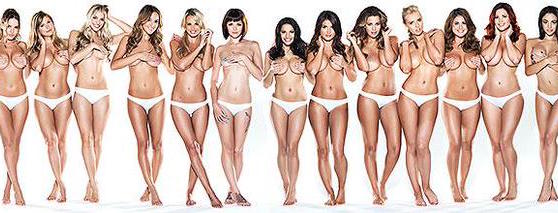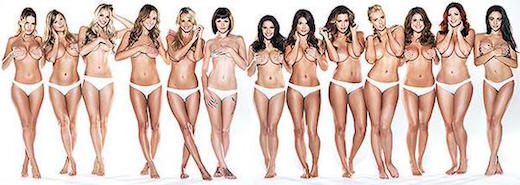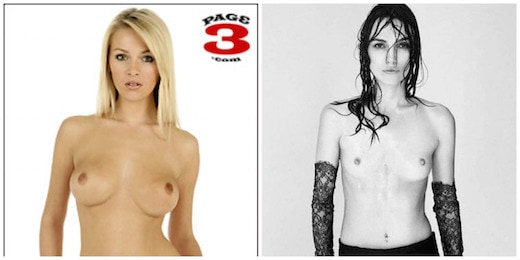The No More Page 3 campaign has been growing in popularity as well as influence since it’s creation in 2012, two years later however and I’m still confused as to the reasons, since their arguments and campaign seems to be full of holes, contradictions and has fallen low enough as to resort to simple bulling. We should save our Page 3 girls, and instead celebrate breasts and the female form.
In New York there is currently a campaign called Free the Nipple, where women of all races and sizes stand up against sexism and and contradictions on how women are portrayed in media by getting topless in public, a right any man has. In the UK there is another campaign, fighting for women’s rights and how they are portrayed in media – only they want to get rid of images of topless women in the country’s best selling newspaper.
The No More Page 3 campaign’s focus is to get rid of the photos of topless women who are featured on page 3 of the UK national newspaper The Sun. On their FAQ’s page, they state that they are not asking for “censorship or for an Act of Parliament” but rather they are asking “politely that page 3 be removed voluntarily.”
Although they say they are not advocating censorship, nor expecting government intervention, their actions speak otherwise. They are currently holding a campaign for supermarkets to censor their newspaper stands, that is, to not show the front covers of newspapers on the newspaper stands. Although to be noted, they also claim that this isn’t censorship.
Tesco will stop displaying tabloid front covers after @NoMorePage3 campaign http://t.co/eU7UTWxViE pic.twitter.com/wXq42vYYmw
— WonderWomen (@TeleWonderWomen) November 21, 2014
When British Prime Minister David Cameron was asked on the subject, he replied “This is an area where we should leave it to consumers to decide, rather than to regulators,” stating that it is a personal choice whether someone buys a newspaper or not. Lucy Holmes, founder of No More Page 3 responded it “peculiar” his response to newspaper censorship vs his online censorship, although why she needed to comment at all, or believe that the two forms of media should be mutually exclusive on their censorship policies baffles me. Not to mention, David Cameron hasn’t actually banned breasts from the internet.
There are many reasons why they believe Our Page 3 Girls should be removed, varying from, “Young boys who see these pictures are less likely to treat women and girls with respect.”, to how it gives an unrealistic expectation of women’s bodies, claiming that “The models are professionally made up, posed and lit just like magazines and the image is very likely to be airbrushed (although we cannot say for definite as they do not have to reveal this information) so not even the model looks quite like the picture.”. They also believe that it exposes children to sexual elements, as anyone can buy a newspaper, and that they aren’t hidden on the top shelves of magazine stands.
Reading through their website, I felt that they had a lot of issues with our society, how we feel about the objectification and sexualisation of women, the violence and disrespect directed at women, the body standards women face – all valid concerns, however non I feel are direct results of the Page 3 images The Sun publishes. It’s unrealistic to blame a single picture in a newspaper to be the cause of all things ill, and rather than look at the bigger picture they instead target a part of society that really, probably makes no difference. At least, no reputable scientific study has been made into the correlation between The Sun’s Page 3 and sexual violence against women.
If boys are treating girls with disrespect, do we blame the newspaper? I personally feel that education should come mostly from family and school. Parents should teach their sons not to be violent against girls, to not be disrespectful against girls. Teachers should teach male pupils to not objectify their female classmates. If one photo of a topless girl can undermine both of these institutes, then I think we have a bigger problem in society and that is what are we teaching our children?
Although they claim to be against the newspaper, the editorial team and specifically not the consenting models, why do they use the model’s bodies as a form of argument? To me, that sounds like a direct attack. If they did any research, they’d see that Alison Webster, official photographer for Page 3 states “All the Page 3 girls are slim without being skinny and fit and toned, they are all over 18 years of age and have natural boobs.”
The models work hard for their body image. They train to stay toned, they eat healthy to stay slim. Non of them look malnourished, and non of them look obese. I have personally seen models with small breasts appear on Page 3. The models are beautiful, and proud of what they do, they consent to the publication and don’t feel objectified. Why is it ok to judge their work, whilst not judging fashion models or actresses?
Kate Moss started modelling at the age of 14, with topless pictures taken as early as when she was 15. Keira Knightly recently did a topless photoshoot to show the world female empowerment. Neither of these women, nor their images, have been censored from publications. Or do we deem them better than the models that appear on Page 3? Are those women different in anyway that we allow them to be treated with moral judgements as such?
No More Page 3 refers to the photos of the photos of the models as soft-core porn because the word porn brings about it’s own stigma. Softcore porn is a lose term, and can be defined as anything that involves upper torso nudity in both men and women, full nudity in men and women on the conditions genitalia isn’t shown. So if our topless page 3 girls are soft-core porn, so are celebrities that get topless for awareness or topless images for breast cancer awareness.
No More Page 3 claims their campaign is about politely asking The Sun to take down it’s glamour model pictures on Page 3. The Sun has declined, as evident in their lack of taking it down. The consumers have also made their point by continuing to buy the newspaper. So if they decide they still need to campaign, then I think it’s high time we respond in defence of our girls, who work hard and are proud of their position. To save our Page 3 girls isn’t to support sexism or violence against girls, it’s to say we as human beings don’t need to hide nipple to be decent people.






